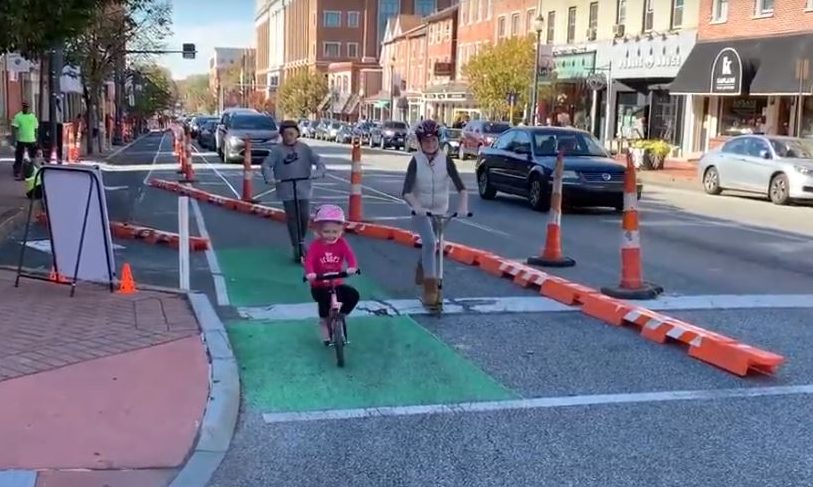
West Chester demos what a protected bike lane could look like, if HB 792 passes.
Throughout 2019, the Bicycle Coalition, Bike Pittsburgh, and more than 30 organizations around Pennsylvania have been fighting to pass several pieces of legislation, including legislation that would make it easier for Pennsylvania to install parking-protected bike lanes and pedestrian plazas. As the year comes to a close, we’re closer than ever to passing those pieces of legislation — but we’re not there, yet.
Here’s where we stand on three key pieces of legislation we’re working on.
HB 792 – Protected Bike Lanes and Pedestrian Plazas
HB 792 is the legislation about which the Bicycle Coalition of Greater Philadelphia and our supporters have been the most hands-on. This legislation would make it easier to protect bike lanes and create new pedestrian plazas using parked cars as barriers between people and moving motor vehicle traffic.
Currently, Pennsylvania state law says motor vehicles need to be parked within 12 inches of a curb. This legislation would essentially change that, allowing for vehicles to park outside a bike lane and/or plaza.
This seems like a weird reason to not allow protected bike lanes — but it’s helped obstruct and/or block several bike lane projects across the state, and in Philadelphia. The bike lanes we have in Philadelphia are either considered PILOTs or were installed on local streets using local money. By allowing PennDOT to build protected bike lanes on our streets, infrastructure work can get done much faster.
Along with Bike Pittsburgh and a number of bike and pedestrian and bicycling groups in Pennsylvania, we are working to get this bill through the Senate Transportation Committee and the full Senate before the next paving season. If you haven’t yet, please call the Senate Transportation Leadership, and demand this legislation come up for a vote next time the Transportation Committee meets.
HB1356 – Vulnerable User
With Families for Safe Streets Greater Philadelphia and other organizations, we are supporting the Vulnerable User bill in the Legislature. The original version of this legislation we supported would “define the term “Vulnerable Highway User” and increase the penalties for a person convicted of reckless or careless driving that results in either the death, serious bodily injury, or bodily injury of a Vulnerable Highway User.”
Among other things, we support this legislation to help change the dialogue around motorists who injure and kill pedestrians and bicyclists. We’ve been lobbying and advocating for this legislation over the past year. Here’s what happened since we last wrote about this bill. First — and most importantly — after much debate, the bill was a bit watered down, but it passed out of the House Transportation Committee on November 18th.
On the upside:
- The bill defines Vulnerable Users to include pedestrians, bicyclists, individuals in self propelled wheelchairs and devices designed for those with mobility impairments, people on electric bicycles, persons on animals and animal-drawn vehicles, and motorcyclists.
- The bill increases fines for those found to have unintentionally killed, caused major bodily injury or bodily injury to vulnerable users through careless driving.
On downside:
- The bill eliminated the provision that would have extended a four foot overtaking requirement to all vulnerable users; the four foot passage rule for bicyclists is not impacted.
- The bill eliminated the increase in fines for those who unintentionally killed vulnerable users through reckless driving.
Next step:
- The bill moves to the Senate
SB607 – Radar for Local Enforcement
Pennsylvania is the only state in the country in which local police departments cannot use RADAR to enforce speed. While we do not endorse more people being pulled over, most traffic deaths in Philadelphia have been attributed to speeding motor vehicles, according to local police reports.
On November 18, the House Transportation Committee amended SB607, which had been passed by the Senate this past June. While the House amended version weakens the bill somewhat, let’s keep in mind that this is the upteenth time that the Assembly has tried to pass a radar bill.
Now that it’s been amended, the bill will go back to the Senate.
